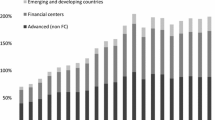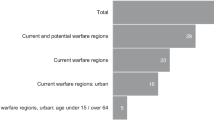Abstract
Although the main responsibility for carrying out economic reforms in the countries of Central and Eastern Europe lies with these countries themselves, the transformation of the Soviet-style economic system into a market economy must be made easier by support from abroad. In this the International Monetary Fund and the World Bank will play an important part.
Similar content being viewed by others
References
IMF et al.: A Study of the Soviet Union, 3 vols., Paris, February 1991.
The Compensatory and Contingency Fund Facility.
See also Willi Wapenhans: The Challenge of Economic Reforms in Eastern Europe, in: Finance and Development, Washington, December 1990, pp. 2–5.
Author information
Authors and Affiliations
Additional information
The article expresses the private opinion of the authors. The article was finalized at the end of November 1991.
Rights and permissions
About this article
Cite this article
Kleine, KH., Thien, E. The role of the IMF and the World Bank in the former Eastern Bloc countries. Intereconomics 27, 20–27 (1992). https://doi.org/10.1007/BF02929421
Issue Date:
DOI: https://doi.org/10.1007/BF02929421




